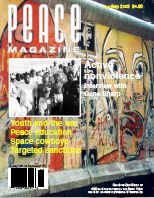
Peace Magazine Jul-Sep 2003, page 21. Some rights reserved.
Search for other articles by Rene Wadlow here
We can foresee other tensions in the area besides those in Iraq and Israel/Palestine
With the end of the first phase of the war on Iraq and the delivery of the "road map" for an Israeli-Palestinian settlement, the strategic pattern of the wider Middle East is being redrawn. Unless those who said "No to War in Iraq" become a transnational movement for peace and justice in the area, the outcome will be shaped only by influential Americans. What alternatives, then, can we see?
Middle East security questions need to be addressed within a permanent institution, not just depend on ad hoc conferences. While the United Nations remains the overarching organization, it is important to have a regional body with an independent secretariat too.1
The prime example of a multi-purpose regional security organization is the Organization for Security and Cooperation in Europe (OSCE). It arose from efforts in the late 1960s to organize structured discussions between NATO, the Warsaw Pact, and the neutral European countries. It was founded at a summit in Helsinki in 1975. Military confidence-building measures and arms control; economic cooperation; human rights; and cultural development were its areas.
The OSCE was first called the Conference for Security and Cooperation in Europe (CSCE), and many diplomats saw it as a "one-time" meeting, after which everyone would return to doing things as before.
However, European States that were not members of either military alliance saw in the OSCE a way to propose new policies. Switzerland pushed for a court of arbitration, now housed in Geneva, Sweden for greater confidence-building measures leading to arms reductions, and Finland for an institutional framework for its ongoing East-West bridging role.
To the surprise of all the governments, people (especially in Eastern Europe) read the fine print of the Helsinki Treaty and saw that the "human dimension" elements could be used to advance human rights -- despite the fact that the term "human rights" had been expressly replaced by the largely contentless term "human dimension." Non-governmental Helsinki Committees were created in many countries, and in the Soviet Union and Eastern Europe they became vehicles for human rights.
Today, the OSCE has a decentralized secretariat and a host of conflict-reduction missions as well as technical assistance programs for strengthening civil society and the independence of the press. While the OSCE has not fully lived up to its security aims, as the conflicts in former Yugoslavia and Chechnya show, the record is encouraging. Precedents have been set, including the creation of a court of arbitration, a High Commissioner on National Minorities, and a Parliamentary Assembly where elected members of national parliaments meet to discuss policy andcooperation.
Obviously, the political and socio-economic conditions in the Middle East differ from those of Cold War Europe. What is common is the desire on the part of the ruling elites to freeze the status quo in the face of currents demanding change; the need to legitimize Israel -- like East Germany, the "new State" in its area -- and the need for a permanent, multi-purpose body in which discussions can be carried on at regular intervals.
The Middle East needs such a security and cooperation framework. Beyond the Iraq and Israel-Palestine conflicts there are other tensions in the Middle East area, currently overshadowed, concerning water, minorities, natural resources, and relations with Central Asia. These tensions can grow if not discussed openly and creatively.
Most historical progress is achieved by leaders who can discern the main currents of their time and give a new sense of direction. Today, the times call for the creation of an Organization for Security and Cooperation in the Middle East.
1 For an outline of some of the roles which an Organization for Security and Cooperation in the Middle East could play, see Johan Galtung and Carl G. Jacobsen. Searching for Peace. The road to TRANSCEND (London: Pluto Press, 2000.)

Peace Magazine Jul-Sep 2003, page 21. Some rights reserved.
Search for other articles by Rene Wadlow here